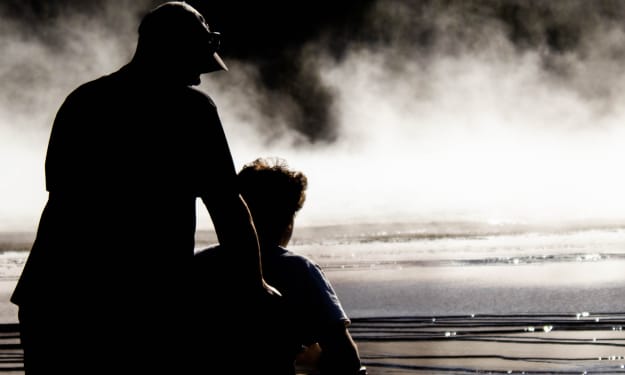My Guide through the Dark
Sometimes, we need a guiding hand to help us find our way when we're lost

I broke my neck in a diving accident on July 2nd, 2005, rendering me a quadriplegic.
I spent six weeks lying flat on my back, two of which were spent eating and breathing through a tube. Shrugging my shoulders and blinking were my only voluntary movements.
The doctors said I was lucky to have survived the accident.
Maybe I was.
But at the time, I wished I’d died. It would have been easier.
Recovering from a traumatic spinal cord injury is a slow and agonizing recovery. Once I was stable enough, I was moved to the Santa Clara Valley Medical Center in San Jose to begin my acute rehab. I spent another two weeks in an intensive care unit before I could begin physical and occupational therapy.
Before the accident, I was an all-star offensive lineman and a champion shot putter.

In the therapy gym, I struggled to start moving my arms again. Finger movements were months away. Fine motor dexterity would never return. Every day in the therapy gym was a reminder of just how broken I was.
And I would never walk again.
I thought my life was over.
The days were dark. Nights, sleepless.
Hope became an abstract concept. Anger, frustration, and sadness were my constant companions.
Despite the wonderful friends and family who sometimes drove hours to hang out for fifteen minutes to express their well-wishes, despite the phenomenal therapists, doctors, and nurses, and despite my mom spending her every waking minute being my biggest cheerleader, I didn’t want to go on living. Not like that.
Then, I met a man named Richard Patterson. He had broken his neck in the early 1980’s. He could move his arms some, but he had no hand or finger function. He had no sensation below his chest. Despite having a thin frame and weighing maybe 100 pounds, he got around in an electric wheelchair.
He had a soft, raspy voice, almost grandfatherly. Even though he was in his early 40’s, it suited him, in part, due to his short, greying hair. His voice was affected by a botched tracheotomy he’d had following his accident. He wore a permanent reminder of this in the form of a nasty, deeply indented scar at the base of his neck.
He was the first person I remember meeting who had gone through what I was currently going through and come out the other side ok.
What blew me away was, despite everything he’d been through and the limitations he had lived with for 25 years at that point, he was happy. More than that, he had a zest for life. He was active in the local disability community. He played tennis. Not well, he would chuckle and tell people. Without any grip in his hands, he needed someone to affix a racket into his hand with an ace bandage or athletic tape.
Mostly, he played for the conversation and the enjoyment of being outdoors when the weather was nice.
At the time, Richard was working as the head of the peer counseling services at the rehab hospital I was at.

I met him during occupational therapy one morning. I was struggling to get a zipped pouch open. Not having any pincer movement in my fingers, I couldn’t get enough of a grip on the zipper to open the pouch, much less pick up the quarters, nickels, dimes, and pennies I had been tasked with putting in it.
I wanted to throw the fucking thing across the room…but I wasn’t able to do that either.
Seeing my frustration, Richard rolled over and introduced himself. He showed me how he had learned to open zippers. Pinning the pouch to the table with one hand, he used his thumbnail to wiggle the zipper open enough to hook his whole thumb through the opening and slide the zipper open. He then slid each coin to the edge of the table where they fell into the pouch he had wedged open with his opposite hand.
That was the first lesson of many lessons I would learn from him.
Every Monday after therapy, Richard led a group counselling session. All of the patients in the spinal cord injury unit were welcome, even if they had to be rolled in while lying in their hospital beds, as sometimes happened with newcomers to the unit.
Richard would answer questions we had, no matter how personal. And he would do so frankly and honestly, sometimes to people’s disappointment.
Occasionally to their horror.
He didn’t mince words about the reality of living with a spinal cord injury.
When I brought up how brutally honest he could be, he replied, “I don’t mean to frighten anyone or take away their hope. But lying to them would be doing them a greater disservice. Hiding from the reality of our situations doesn’t make them different or better.”
He would listen to everyone. No matter what they wanted to say, no matter how angry, sad, explicit, or even vulgar, he sat calmly and listened.
“People sometimes need to get out their frustration and anger, or to allow themselves to be sad and grieve the loss of their able-bodied life before they begin to heal,” he once told me after a particularly emotional group session. “No one has to be happy about this,” he said, knocking on the frame of his wheelchair. “But if they don’t accept it, they won’t adapt and move forward.”
Sadly, experience has proven his words true. He told me stories of patients who’d come through the hospital and had never gotten past the fact that they were now disabled. Most of them loaded up on their medications and sunk into deep depressions. Many developed substance abuse problems. Almost all of them had, at some point, alienated the people closest to them.
In the sixteen years since my accident, I’ve seen it firsthand as well.
“It’s why I do what I do,” he told me over lunch one day. “I want to show people who end up in chairs that they’re not alone. I want them to go on living, not just existing. Just because we can’t walk, it doesn’t mean our lives aren’t worth living.”
It was the first time I’d heard that. It was something I needed to hear, even if I was still in the early stages of recovery.
I’m glad to say that time has proven him right.

He would offer whatever insight he could into people’s individual situations. He would also put them in contact with members of the local disability community based on things they shared in common. Not in an “I don’t know what to do with you, so I’m going to pass you off to someone else” sort of way. It was more that there were a lot of patients, and only one of him. His distribution of mentorship helped people get more one-on-one attention and specified peer counselling.
However, Richard took the time to mentor me himself.
Richard showed me his adapted van. It was set up with a lift that would elevate his power chair into the middle of the vehicle. He had a sling set up to support his upper body so he could transfer into the driver’s seat, even with his limited mobility and upper body strength.
I got to go to his house one day. He showed me how he had his bed and bathroom facilities rigged so he could use them independently. He talked to me about the part-time health care aide that came by a couple times a week to check on him and take care of anything he needed help with or couldn’t do on his own.
He even took me out to a comedy club one evening. I had to get special dispensation from the rehab hospital, but because of who Richard was, I was able to do so.

This was a significant positive turning point in my recovery. It was the first time I began to feel comfortable being out in public in my wheelchair. Moreover, it was a much-needed break from the rehab hospital. As amazing as my doctors and therapists were, and despite having become good friends with many of my fellow patients, rehab could be a soul-crushing, depressing place.
Richard knew this well.
At that point in time, he and I were close enough that I felt comfortable asking him personal questions about me or about him and his experiences. Even after I got out of the halo vest I’d been bolted into for four long months, I was worried that I was this hideous human oddity. I was worried that, eventually, my friends would stop coming by and cut me from their lives, being unable to cope with my newly acquired disability.
“Some of them might,” he said. “For some people,” he paused as he gestured down to his own wheelchair, “this is too much. But for others, for the people who really care about you, it won’t be an issue.” He chuckled as he patted his chair’s armrest. “These things are pretty good bullshit filters.”
I couldn’t help but laugh.
“What about love, dating, and sex?” I asked.
Hey, I was crippled, not dead.
He laughed. “Those are three separate issues,” he said. “All of those are still possible. They’ll probably be a little different than they used to be, but if you want them, you can still have them.”
“…all of them?” I asked.
“All of them,” he said, knowing the thinly-veiled point I was getting at.
After I left the rehab hospital for the last time (I went back for more therapy after I’d gotten my halo vest off) I kept in contact with Richard. By then, he wasn’t just a mentor.
He was a friend.
I still had a lot of physical recovery and continuing therapy to do. I was still coping with the mental and emotional trauma from my accident. I was still getting accustomed to being out in public while in my wheelchair.
I would have more mentors along the way, people who would help me in various aspects of my recovery and in adjusting to and thriving in my newfound disabled life.
But Richard was the first. Without the foundation he’d helped me build, I doubt I would have regained my independence, learned how to drive an adapted car, gone back to college…and graduated. It would have taken me much longer to process my grief following the loss of my able-bodied life. It would have taken me much longer to find my confidence, if I ever found it at all.
***
Richard passed away in 2011.
While he wasn’t in perfect health, he seemed to be doing well every time we spoke or emailed. At the time, I was attending the University of Arizona.

I was buried in homework, studying, and essays. I had also just gone through a sudden and unexpected break up with my first girlfriend post-injury.
I was tunnel-visioned on school. I was also drinking too much at the time, a poor coping mechanism for all the stress and depression. Consequently, it took me an embarrassingly long time to realize I hadn’t heard from Richard in a while. If I remember correctly, a friend of mine and fellow spinal cord injury patient who had also worked with Richard while we were in rehab together, was the one who eventually told me of his death a few months after he passed.
I felt numb at first. How could he have died? He was only 48.
It didn’t seem real.
His death was a difficult one to process and mourn.
Richard had been a light in the darkness. Not just for me, but for thousands of patients that had come through Santa Clara Valley Medical Center.
Now that light was gone.
It saddened me that no one else would benefit from his years of experience, his wisdom, his kindness, and his willingness to listen, and to speak candidly about life with a spinal cord injury.
The world is a darker, less hopeful place without him in it.
I’m lucky and immensely grateful to have had him in my life, even if it was only for a few years. His example of generosity and desire to help others is one that has inspired me and many others to pick up where he left off. To help, mentor, and be there to listen for those who need it.
In that way, a small part of him will live on and continue to light the way for those struggling to find their path through the darkest part of their lives.
***
In loving memory of Richard Patterson. You can read his obituary to see the impact he had on his community and the people who found themselves as patients at Valley Med.
***
If you liked this story and/or my writing, sign up for my email list to stay up to date on new stories, upcoming features, and cool news.
You can also follow me on Twitter, Instagram, Medium, and BitClout.
About the Creator
Matthew B. Johnson
Just a writer looking to peddle his stories. TOP WRITER on Medium in Humor, This Happened to Me, Mental Health, Disability, and Life Lessons. C-5 incomplete quadriplegic. I love comic books, coffee, all things Dragon Age, and the 49ers.






Comments
There are no comments for this story
Be the first to respond and start the conversation.